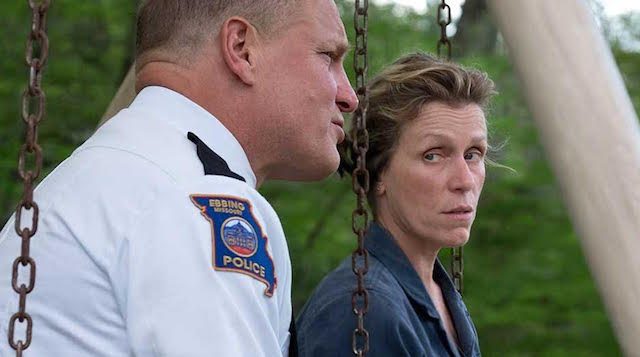Making the rounds for next year’s Oscar predictions is Frances McDormand for “Three Billboards Outside Ebbing, Missouri” and based on the last article I read, she’s the frontrunner to win Best Actress.
I knew very little about the film coming into it when I caught it as the opening film of the Cinema One Originals Festivals and it was really the best way to watch this movie. Academy Award winner McDormand plays Mildred Hayes, a woman who rents three billboards to shame the police for not having solved the rape and murder of her daughter. It’s dark and it’s heavy but it’s also unexpectedly funny and poignant and moving.
The movie begins without any exposition running straight into Mildred’s decision to rent the billboards. The public shaming creates tension between Mildred and the police led by Police Chief William Willoughby (Woody Harrelson) and his second-in-command Officer Dixon (Sam Rockwell).
As the small town of Ebbing, Missouri reacts to such a huge act of disrespect against the well-loved police chief, various themes crash into each other that range from police brutality, racism, hate speech, domestic violence, justice, vengeance, compassion, and forgiveness.
“Three Billboards Outside Ebbing, Missouri” pulls no punches from the moment the film starts.
Each story beat opens up a whole new can of worms for all the characters. The film’s setting, a provincial town in the middle of nowhere America, is key to the explosive stories that are brought to the service. There’s crass language and a very old-school, straightforward sense of community that is on display in this film. It opens up a whole lot of discussions about social structures but it also creates a space for amazing comedic moments.
Frances McDormand’s portrayal of Mildred can definitely win her another Oscar. She’s fearless both as an actress and as a character that she presents us. McDormand’s Mildred is a woman with nothing to lose. Unable to move on from the tragedy of her daughter’s murder, she’s taking down everyone with her on her spiral of frustration and anger but she’s still capable of connecting with her son Robbie (Lucas Hedges) and the people she works with.
This is a woman who is at the end of her rope but there’s still the person she used to be in there and McDormand gives us flashes of it when she’s not in full combat mode or drowning in grief.
Playing wonderfully opposite her is Woody Harrelson’s police chief Willoughby. The patience and respect that he gives this hostile woman helps create the world of Mildred that we don’t see in the film, the person before the tragedy. With the setting of a small town where everybody knows each other, the world beyond the film is made whole and true.
Enhancing Harrelson’s portrayal is Sam Rockwell’s Dixon, an alcoholic with an overbearing mother and a history of racial tension with the black community of Ebbing. While Willoughby is professional and thoughtful, Dixon is brash and full of himself. It is Dixon who is most offended by Mildred’s actions and becomes her toughest opponent.
Rockwell is fascinating as the hateful Dixon, saying inappropriate things and totally unfazed as he’s reprimanded by almost everyone around him. It’s a daring performance that’s made even more powerful when Rockwell opens Dixon’s world to us later on to show us his inner world and the vulnerability of the character.
Actually, everyone in the film is amazing, with a special call out to Samara Weaving, who plays Penelope, the 19-year-old girlfriend of Mildred’s ex-husband. But the whole town of Ebbing, Missouri comes alive in this movie that starts right at the heart of the action and introduces us into these character’s inner worlds as they navigate this horrible crime that appears to have no real resolution.
The movie keeps you guessing at every turn but always manages to circle back towards its themes of compassion and forgiveness. You are laughing and crying at the same time because the world is just so real and true. I won’t be surprised if it wins an Oscar for Best Original Screenplay as well.









